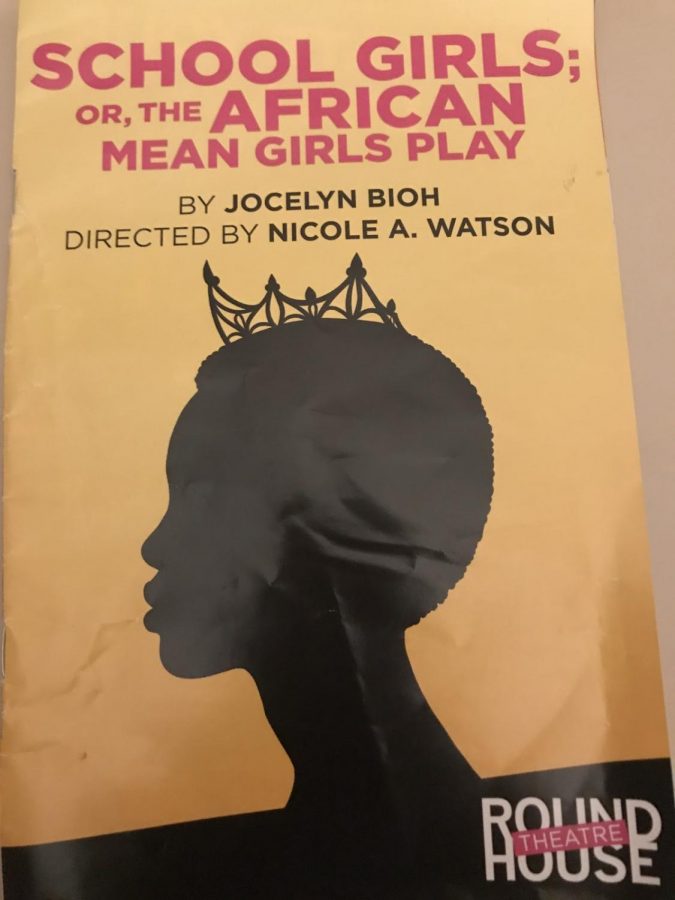School Girls; or the African Mean Girls Play brings the Mean Girls of Ghana to D.C.
The playbill for School Girls; or the African Mean Girls Play. In September, it began performances at the Round House Theater. Photo by Alex Schwartz.
November 1, 2019
Hitting the Round House Theater at the start of September, School Girls; or the African Mean Girls Play, is a hit in the realm of off-broadway performances. Set in central Ghana during 1986, School Girls is full of high school drama, with cliques, gossip, and of course: mean girls.
Paula is the queen bee of her high school with “rich” American cousins who work in the famous fast food joint restaurant, White Castle. Paula (Kashayna Johnson) and her posse – Giffy (Moriamo Temidayo), Mercury (Debora Crabbi), Ama (Awa Sal Secko), and Nana (Jade Jones) – are preparing for the global beauty pageant that the Ms. Ghana winner of 1865, Eloise (Shirine Babb), is scouting for.
Paula has her heart set on becoming the next Ms. Ghana, when a new light-skinned (biracial) girl, Erika, comes to the boarding school. Erika (Claire Saunders), who has just moved from America, creates a rift in Paula’s hierarchy.
Themes of racism and colorism then get explored when Eloise, the pageant scout, comes to the boarding school. The physical standards of the pageant are displayed to be immensely distorted as Eloise searches for the more “universal” appeal of lighter-skinned girls. Needless to say, this doesn’t help Paula and Erika’s relationship.
School Girls is almost slight in its 90 minutes run time, but all characters are immensely fleshed out. Even the minor members of Paula’s posey are extremely sympathetic. Watching Paula take advantage of the eager-to-please Nana and insecure Giffy made my heart ache.
The dynamic between Paula and Erica is definitely the most enjoyable aspect of the play. Paula has spent her entire life aspiring to distorted ideals brought on by racism. To her, Erica seems naive, yet immensely privileged.
Paula isn’t really wrong. Erica is unaware of the racism her friends are facing until she talks with Paula. Unfortunately, this same ignorance is why Paula disregards Erica’s experience with racism.
The best moment in the play is when Erica fails to place in the pageant do both characters understand each other. Erica can only be seen by the rest of the world as an African, just as Paula can only be seen as “dark” by her community. Both are seen as inferior.
The plot is simple enough to imagine Mean Girls with a beauty pageant with the theme of racism. School Girls has a pretty short run time, so its plot needs to be straightforward.
Unfortunately, at times School Girls bites off more than it can chew in terms of plot points.
During the scene where the girls confront Paula, we get many bombshells onto us relating the imprisonment of one of the girl’s family members. These plot points are then completely forgotten.
School Girls is a very well acted play. All the characters feel genuine. Also, for the and humor to work, the actors must be able to maintain sharp dialogue and timing. Fortunately, they definitely succeeded and the humor of School Girls is on point.
School Girls is a character-driven play that handles its characters with impressive depth. It provides witty dialogue while also delivering emotionally. School Girls portrays the theme of racism excellently, but sometimes jumbles to many themes together. School Girls might not be as iconic as the original Mean Girls, but it is just as meaningful.









